Don Hill Legacy Award – OSCIA
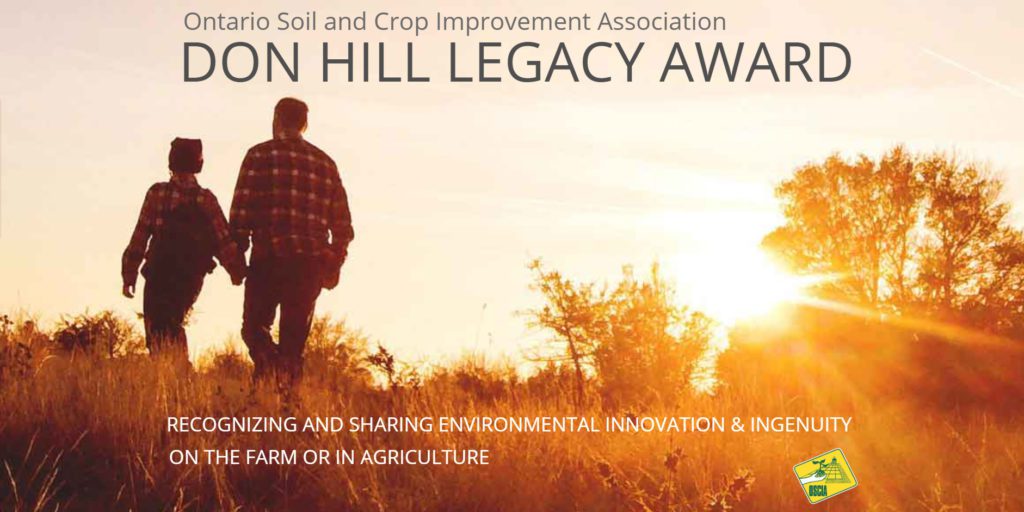
The Don Hill Legacy Award honouring on-farm innovation was established in 2019 in memory of past OSCIA president Don Hill.
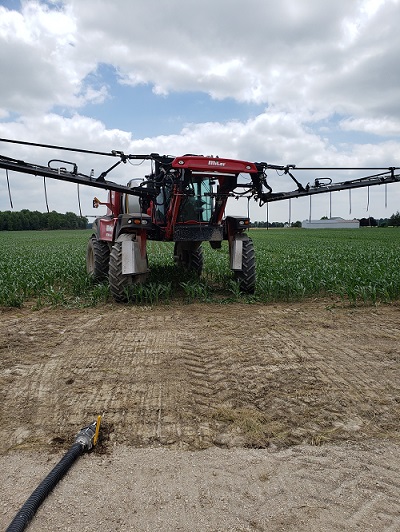 David and Roger Buurma’s patience and ingenuity in the shop to perfect a low-cost solution for side-dressing nitrogen in corn has won them the 2021 Don Hill Legacy Award.
David and Roger Buurma’s patience and ingenuity in the shop to perfect a low-cost solution for side-dressing nitrogen in corn has won them the 2021 Don Hill Legacy Award.
The Lambton County grain farmers have perfected an easy-to-use rubber hose dropping system that enables efficient, accurate nitrogen delivery into a taller corn canopy using the 120-foot boom on their self-propelled sprayer.
The award is given annually by the Ontario Soil and Crop Improvement Association (OSCIA) to recognize a recipient who has applied on-farm innovation and ingenuity to effectively address an identified environmental risk associated with soil, water, air, or biodiversity on their farm.
“This innovation reflects the spirit of the Don Hill Legacy Award – it’s a simple, low cost and effective solution to an environmental challenge on the farm,” says OSCIA President Chad Anderson. “Don had a passion for the Environmental Farm Plan and its ability to enable on-farm innovation and problemsolving.”
The Buurmas picked up on work their father had started with streaming Urea Ammonium Nitrate (UAN) 28% onto corn using a self-propelled sprayer after having had good results with the technique in his wheat crop. They needed a solution to avoid crop damage from the liquid fertilizer splashing onto the plants and minimize nitrogen loss into the atmosphere through volatilization.
They mounted rubber hosing onto the spray nozzles of their 120-ft boom sprayer and dragging these over the soil into taller corn. The sprayer’s GPS unit ensures accuracy and at a travel speed of five to eight miles per hour, applications can be finished quickly and precisely.
Travelling up and down fewer rows in each field at a faster speed using their sprayer means they’re finishing up their nitrogen application about 75% faster compared to using the standard, pull-type sidedress equipment. The total cost of their sprayer retrofit was approximately $400.
The Don Hill Award, which comes with a $1,000 cash prize, was established in 2019 in memory of past OSCIA president Don Hill. Hill was passionate about the Environmental Farm Plan and finding simple yet creative solutions to environmental challenges faced on the farm.
Source : OSCIA
Past Winners
- 1985 – Bill Wright
- 1986 = William Wammes
- 1987 – Ron McEwen
- 1988 – Gorden Brooksbank
- 1989 – Randy Molzan
- 1990 – Tony Bahro
- 1991 – Ted Deelstra
- 1992 – George Cornelissen
- 1993 – Nathan Sparling
- 1994 – John Lammers
- 1995 – John Straatman
- 1996 – Tim and Wes Williams
- 1997 – Roy Vandamme
- 1998 – Annbee Farms
- 1999 – Daniel Konzelmann
- 2000 – Donald McGugan
- 2001 – Bill Wray
- 2003 – Mike Belan Jr.
- 2004 – Walnut Acres Farms Inc.
- 2005 – Ron Wilcox
- 2006 – Doug and Dave McGee
- 2007 – George and Agnes Dickenson
- 2008 – Henry J. Peters
- 2009 – Joe Kerr
- 2010 – Kevin Marriott
- 2011 – Joe Kerr
- 2012 – Brian Sparling
- 2013 – Ron MacDougall
- 2014 – Don and Irene Van Gorkum
Province of Ontario – Excellence in Agriculture

The Excellence in Agriculture program recognizes agri-food innovations that demonstrate leadership, product development or technology advancement that will benefit the agri-food sector. The innovations recognized will help move the sector forward so it is better positioned to thrive here at home and on the global stage.
BioLiNE’s innovation brings fertilizer formulators up a notch. Their unique process uses plant-based material (spent mushroom compost versus traditional soft coal sources), meaning no harsh chemicals, heat and minimal energy is used to produce fulvic acid, an organic compound used to bolster soil properties. Importantly, they are upcycling a product that would otherwise be considered waste.
Ontario – Premier’s Award for Agri-Food Innovation

(2006-2017)
The Premier’s Award for Agri-Food Innovation Excellence program supported and recognized the dedication, hard work and innovation of local agri-food businesses and individuals who added value to existing products, helped create jobs and contributed to economic growth.
Twin Creeks Greenhouse
(Reid Cleland, George Conelissen, Carolyn Cornelissen, Danielle Cornelissen, Mike Cornelissen, Hon Deb Matthews, MPP)
Not long ago, flares were used to burn off the methane produced at the local landfill down the road from Twin Creeks Greenhouse. Today, the excess gas travels 1.8 kilometres by pipeline from the landfill and into a greenhouse boiler, which regulates the greenhouse at perfect growing temperatures. The steady fuel supply reduces the amount of natural gas needed to heat the greenhouse by 65 per cent and allows the producers to grow their crops year-round. The crops take in carbon dioxide produced by burning methane, helping offset the carbon emissions. The construction of the pipeline supported a number of contractors and local businesses, while Twin Creeks plans to add 80 acres to the methane-heated greenhouse operation.
Forest Glen Herb Farm & Bed and Breakfast – Lambton Shores (Dave Hope, Assistant Deputy Minister, Food Safety and Environment Division, Ministry of Agriculture, Food and Rural Affairs and Cynthia Cook)
(Dave Hope, Assistant Deputy Minister, Food Safety and Environment Division, Ministry of Agriculture, Food and Rural Affairs and Cynthia Cook)
A visit to this farm greets you with the aroma of fresh rosemary, sage, mint and lavender all caught on the breezes of Lake Huron. Forest Glen Herb Farm and Bed and Breakfast offers tourists a fragrant back-to-the-land experience. The family-run agri-tourism business regularly welcomes bus tours and day-trippers. Visitors can explore the farm’s many herb gardens, attend an herb class or browse through the 140-year-old barn, remodelled to house an array of culinary and fragrant herbs, dried flowers and other home-made products for sale. You can also stay overnight at the farm’s Edwardian style “Lavender House.” This innovative farm provides a boost to the senses and local tourism.
Chad Anderson (Debbie and Chad Anderson, Maria Van Bommel)
(Debbie and Chad Anderson, Maria Van Bommel)
A shortage of hay in 2008 got beef producer Chad Anderson thinking about alternatives. What he came up with has reduced hay consumption on his farm by 20 per cent and provided a nutritional supplement that his 100 head of cattle feed themselves. The invention is a lick tank filled with condensed corn distillers solubles (CDS), a by-product of corn ethanol manufacturing. CDS is delivered directly from the ethanol plant to the farm where it is stored and then loaded into the lick tank, which Anderson has fitted with a sled so that it can be moved around during pasturing. With grain prices increasing, Anderson believes that this is a good way for beef farmers to boost their bottom lines.
Envirofresh Farms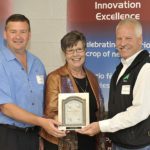 (Art Caron, Maria Van Bommel and Mark Huzevka)
(Art Caron, Maria Van Bommel and Mark Huzevka)
When two friends combined their engineering expertise and greenhouse growing experience, their team approach resulted in a new vegetable operation that captures waste heat and CO2 (carbon dioxide) from an adjacent manufacturing industry. Envirofresh Farms grows 23 acres of greenhouse peppers beside Terra Industries, a manufacturer of nitrogen fertilizer. The two have established a symbiotic relationship. The greenhouse operation needs the equivalent of energy required to supply 1,400 homes. Being able to draw free heat via pipelines directly from the neighbouring manufacturer’s byproducts means a huge reduction in energy costs for the greenhouse. In addition, the high quality CO2 that’s captured and piped into the greenhouse is good for the plants, and it’s good for the manufacturer too, since it reduces the amount of CO2 it releases into the atmosphere. Envirofresh is a great example of how agriculture and industry can be good neighbours and boost each other’s sustainability. Its peppers are a “greener” green.
Hog-Tied Farms Ltd. (Maria Van Bommel, Mitchell and Cassie VanEngelen)
(Maria Van Bommel, Mitchell and Cassie VanEngelen)
A US-based ventilation system that John VanEngelen modified to meet his own hog operation’s needs is lowering production costs while improving air quality, increasing growth rates, and making barns safer and more environmentally friendly. Twelve fans support 16 rooms at the facility, compared to the one to three fans per room in traditional hog barns. His system has also shown that the pigs are ready for market in 15 per cent less time than in more traditional systems. VanEngelen has hosted many farm tours, and at least eight other barns in the area have been built using the same technology in the last six years.
MacKellar Farms (Maria Van Bommel and Jacob MacKellar)
(Maria Van Bommel and Jacob MacKellar)
When Jacob MacKellar was looking for a value-added product to supplement his 3,000 acre cash crop operation, he chose edamame, which is a type of soybean harvested in the pod right before it reaches the “hardening” stage. It is a popular food in Asia and, increasingly, in North America that is consumed as a snack or as a vegetable dish, used in soups or processed into sweets. This non-traditional crop replaces imports and provides excellent returns. Industry representatives project a 500,000 pound market in the next few years, and McKellar will be ahead of the pack, with a planned harvest of 100,000 pounds in
Al McColl Farms (Maria Van Bommel, Mark and Alex McColl)
(Maria Van Bommel, Mark and Alex McColl)
The McColl family not only automated their turkey farm, they made it into a state-of-the-art production facility that they have fitted out for maximum efficiency. A number of improvements over the years have meant increased biosecurity, decreased labour, more eggs laid, reduced energy use and better income. The business has a flock of 3,600 breeding hens, and the barns have natural ventilation, automated feeding systems, compact fluorescent lighting and more. Biosecurity is maintained since everything is connected so that no one ever needs to go outside. A new facility, which has gone through all the development stages, is being built and will mean even greater achievements: 50 per cent more birds using only 10 per cent more labour than the original operation.
Steve Vokes (Maria Van Bommel and Steve Vokes)
(Maria Van Bommel and Steve Vokes)
You’d think farming on flat land would be easy, but Steve Vokes, who crops on more than 2,000 acres in Lambton County, knows that every terrain comes with different challenges. Flat land needs several municipal ditches to provide outlets for farm drainage systems. But keeping the drains clean and functioning can be expensive and time-consuming for farmers and municipalities. Vokes created a solution in his own farm shop. His excavator device is based on “wicking” principles and involves directly wet-rolling the surfaces of unwanted vegetation with herbicides. This targeted approach prevents spraying herbicide to other plants. By modifying his excavator, Vokes can easily access both sides of the ditches from one location by “rolling” along the vegetation, since pulling out weeds and woody growth by the roots could destabilize the banks. This one man show pays huge dividends with regard to operator safety and maintaining clear, stable ditch banks.
Buurma Farms – Watford (MPP for Lambton, Kent, Middlesex Maria Van Bommel, Harry Buurma and Roger Buurma)
(MPP for Lambton, Kent, Middlesex Maria Van Bommel, Harry Buurma and Roger Buurma)
Harry Buurma’s innovation could revolutionize the way biosolid pellets are spread on farmland. The pellets he began receiving from the City of Windsor did the job in terms of economically putting nutrients in the soil of his 3,000 acres of cash crops, but the machinery available to get it on those crops was antiquated and inefficient. Using his innovative streak, Buurma landed on the idea of altering the spreader to make it more efficient and environmentally responsible. He took a 26-foot lime and litter spreader and made extensive modifications to it. The spreader was redesigned so that it spreads the pellets evenly and efficiently and avoids spillage during transport. This innovation has resulted in higher crop yields and a better bottom line.
Cedarview Farms – Courtright (MPP for Lambton, Kent, Middlesex Maria Van Bommel, Lauren Van Ewyk and Ken Van Ewyk)
(MPP for Lambton, Kent, Middlesex Maria Van Bommel, Lauren Van Ewyk and Ken Van Ewyk)
Ken and Lauren Van Ewyk have built a ‘cushy’ business out of their sheep farm by gathering wool from their own and neighbours’ animals to make quilt batts, duvets, mattress pads and wheelchair pads. The eco-friendly products are made and sold locally and the market continues to grow. The Van Ewyks raise Suffolk-Dorset ewes, plus beef and lambs for the freezer trade.
Enniskillen Pepper Company Ltd. – Petrolia (MPP for Lambton, Kent, Middlesex, Maria Van Bommel, Jack Greydanus, Jodi Roelands and Adrian Roelands)
(MPP for Lambton, Kent, Middlesex, Maria Van Bommel, Jack Greydanus, Jodi Roelands and Adrian Roelands)
Picking a peck of bigger, better yellow peppers is more possible as a result of an innovation implemented at Adrian Roelands’ greenhouse operation in Lambton County. An ingenious system of fixed and moving wires that are high up in the greenhouse ceiling opens the canopies of individual plants, allowing better sun exposure on the peppers. Seven of the grower’s 13 acres of greenhouse are now operating with the new system in place. An added bonus is that workers don’t have to reach as far to pick the peppers due to denser, closer rows.
Forest Glen Herb Farm – Forest (MPP for Lambton, Kent, Middlesex, Maria Van Bommel, and Cynthia Cook)
(MPP for Lambton, Kent, Middlesex, Maria Van Bommel, and Cynthia Cook)
The extensive collection of heritage plants at Cynthia Cook’s farm are helping new generations learn about centuries-old agricultural techniques. Customers can find out about growing various herbs for culinary, fragrant and medicinal purposes, making teas and other value-added processes. More than 1,500 varieties of herbs grow on this historic property in a setting that includes a house, barn, retail and education centre that are more than 140 years old. Cook is an environmentally conscious farmer and educator who also brings her skill and knowledge to local colleges. The collection of herbs on the farm is unique because many of the herbs were sourced from heritage sites.
Konzelmann Farms Inc. – Wyoming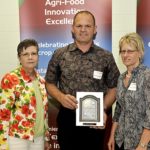 (MPP for Lambton, Kent, Middlesex, Maria Van Bommel, Dan Konzelmann and Miriam Konzelmann)
(MPP for Lambton, Kent, Middlesex, Maria Van Bommel, Dan Konzelmann and Miriam Konzelmann)
Good manure mixing is an important component of organic farming, but it’s not easy when you have to mix as much as 4,000 tonnes of manure to help grow a variety of organic crops on more than a thousand acres. When Dan Konzelmann found that the compost turners he was renting were too small for his needs, he designed and built his own machine. His large-capacity compost turner saves time, energy and expense for the farm. The innovation is creating excellent compost and has generated interest in the local farming community.
Lambton County 4-H Farm Safety Club – Wallaceburg (Mark Langstaff, Deirdra McGee, Casey McGee, Michael McGee, Grant Langstaff, MPP for Lambton, Kent, Middlesex Maria Van Bommel, Jonathan Langstaff, Agnes Dickenson, Daniel Deelstra, George Dickenson, Dave McGee and Doug McGee)
(Mark Langstaff, Deirdra McGee, Casey McGee, Michael McGee, Grant Langstaff, MPP for Lambton, Kent, Middlesex Maria Van Bommel, Jonathan Langstaff, Agnes Dickenson, Daniel Deelstra, George Dickenson, Dave McGee and Doug McGee)
The young people of North Lambton County were devastated when a local teen lost her life by suffocating in a grain bin. Local fire department volunteers were unable to save the girl. The Lambton 4-H Farm Safety Club resolved to help prevent such a tragedy from happening again in their community. The group set about devising and building a grain extrication tool. The new, easy-to-use rescue tool works so well that it has been provided to five local fire departments and grain facilities, who were impressed with its demonstration. The 4-H club is being recognized for its innovative idea, as the tool holds the potential to save lives if it is processed through the Canadian Safety Association approvals for broader use.
Tony Noorloos – Sarnia (MPP for Lambton, Kent, Middlesex Maria Van Bommel and Tony Noorloos)
(MPP for Lambton, Kent, Middlesex Maria Van Bommel and Tony Noorloos)
Building a better mousetrap is one thing, but building a better cattle chute that can efficiently handle 1,100 head of cattle in one day is no small invention. The Noorloos family has been in the cattle business for three generations. They have seen almost every method that exists for moving cattle, and all have come up short in different ways. So, as a winter project, they designed and built a chute that reduces stress, reads individual electronic tags and weighs the cattle to improve livestock management and their profit margins. The invention has caught on, and is currently working in six different feedlots.
Peter and Wilma Aarts (Wilma and Peter Aarts; MPP for Lambton-Kent-Middlesex Maria Van Bommel)
(Wilma and Peter Aarts; MPP for Lambton-Kent-Middlesex Maria Van Bommel)
Switching to switch grass to heat a 1,500 sow operation has reduced this farm’s energy costs and environmental footprint. The farm adapted a high efficiency boiler, typically used in greenhouse operations, designed to burn coal or natural gas to produce heat. The boiler was modified to burn switch grass – a renewable, green energy resource. Within two weeks, the owners no longer needed propane tanks on their farm. They now solely depend on heat generated from the switch grass and predict the high efficiency boiler will help them save up to 80 per cent on their heating bills. This innovation is a greener option that’s easy to warm up to.
Berryhill Farm (Tony and Joanne Hogervorst; MPP for Lambton-Kent-Middlesex Maria Van Bommel)
(Tony and Joanne Hogervorst; MPP for Lambton-Kent-Middlesex Maria Van Bommel)
Berryhill Farm wants its customers to see red. Owners Tony and Joanne Hogervorst have adapted a reusable red basket, modified from the apple industry, to help them market their farm vegetables to local retail grocery chain stores. The basket is a key component to their marketing and delivery system. It’s also easy for stores to display. These innovators negotiate directly with individual stores and ensure that their goods are fresher, larger or offer more guarantees than their warehouse counterparts. The farm uses an extensive inventory tracking system and has more than 2,000 baskets in circulation.
Codan Suffolks (Lynne and Bill Duffield; MPP for Lambton-Kent-Middlesex Maria Van Bommel)
(Lynne and Bill Duffield; MPP for Lambton-Kent-Middlesex Maria Van Bommel)
Bill and Lynne Duffield are building a better flock using DNA testing from ‘down under.’ Theirs is the first Canadian sheep farm to use this technology pioneered by a New Zealand doctor. An FTA card, a chemically treated filter paper used to collect and store DNA, is the key factor that enables the farm to send samples to the other side of the world. The farm sends the cards via international courier and results are returned electronically. The program has enabled them to genetically test for cold tolerance and footrot. This has resulted in better breeding decisions and economic returns for the farm.
Joe Kerr (Joe Kerr and MPP for Lambton-Kent-Middlesex Maria Van Bommel)
(Joe Kerr and MPP for Lambton-Kent-Middlesex Maria Van Bommel)
This farmer is a friend to the environment. After some experimentation, Joe Kerr has established a simple combination of drainage fittings that effectively collect and supply water to wetland, without compromising his field drainage system. To date, 20 acres of farmland has been modified with this new technology. This innovation is a ‘win-win’ as it allows wildlife to enjoy the wetland while the farmer saves money. It’s a great example of environmental stewardship that benefits the business of agriculture.
Sim Farms Ltd. (Simon VanAert and MPP for Lambton-Kent-Middlesex Maria Van Bommel)
(Simon VanAert and MPP for Lambton-Kent-Middlesex Maria Van Bommel)
Simon VanAert had an ‘egg-cellent’ idea. He designed a simple but effective egg trap that captures eggs laid in the feeding system of modern, free range poultry buildings. An aluminum bar directs the eggs into a holding tray until they can be retrieved. This has created numerous cost savings for the operation. The trap eliminates breakage of premium organic/free-range eggs dropping into the fresh food conveyor belt and increases saleable eggs and productivity.
Brier Run Alpacas/Edy’s Mills Fine Fibres (Lambton-Kent-Middlesex MPP Maria Van Bommel; Heather Blanchard; Norris McAuslan)
(Lambton-Kent-Middlesex MPP Maria Van Bommel; Heather Blanchard; Norris McAuslan)
In Lambton County, Brier Run Alpacas and Edy’s Mills Fine Fibres have created a new measure of productivity on the farm – the number of socks per acre. This value-added partnership raises alpacas, harvests their fibre and turns it into a wide range of consumer products – from cones and skeins of fibre to batting and felt to finished consumer goods. Teamwork means that Norris McAuslan earns a living from his alpaca operation and Heather Blanchard maximizes her investment in mill equipment by using it every day.
Char-Creek Farms (Lambton-Kent-Middlesex MPP Maria Van Bommel; Margaret and John Noorloos)
(Lambton-Kent-Middlesex MPP Maria Van Bommel; Margaret and John Noorloos)
John Noorloos of Char-Creek Farms is always busy creating or modifying farm equipment to improve his farm practice. One of his innovations is a tracked manure spreader that has twice the capacity of a conventional solid manure spreader. It includes a hydraulic system with a short (four foot) section of a conventional chain-driven system. His invention is environmentally friendly, reduces soil compaction and has worked well for the operation for many years.
Cornelissen Farms Inc. (Lambton-Kent-Middlesex MPP Maria Van Bommel; Carolyn and George Cornelissen)
(Lambton-Kent-Middlesex MPP Maria Van Bommel; Carolyn and George Cornelissen)
George Cornelissen knows how to keep his chickens cozy. He developed a geothermal broiler barn, where the water used for heating the building is preheated in piping located underground in an adjacent field. This innovation is environmentally friendly and has reduced the farm’s energy costs by 30 per cent. It has also improved production since the farm is able to monitor and fine-tune heat flow, with temperatures controlled at bird level. The farm is one of the first in Ontario to apply an innovative heating system on a large agricultural scale.
Fairwind Farms (Lambton-Kent-Middlesex MPP Maria Van Bommel; Anne-Marie and Mark Lumley)
(Lambton-Kent-Middlesex MPP Maria Van Bommel; Anne-Marie and Mark Lumley)
Mark and Anne-Marie Lumley, of Fairwind Farms in Lambton County, came up with one sweet idea when they developed a way to field pile sugar beets. This North American first allows the Lumleys to clean enough soil off the sugar beets to transport them for processing directly from the field. This method of readying sugar beets for export involves less labour, contributes to the sustainability of the farm, and boosts the bottom line. This innovative approach to harvesting sugar beets has been adopted by four other sugar beet harvesting groups in the county and has attracted groups from the United States to Fairwind Farms.
Fields Farm Ltd. (Left to right: Lambton-Kent-Middlesex MPP Maria Van Bommel; Rita and Anton Felder)
(Left to right: Lambton-Kent-Middlesex MPP Maria Van Bommel; Rita and Anton Felder)
Fields Farm Ltd. in Lambton County is the first large hog operation in Ontario to earn its certification from the Humane Farm Animal Care organization. Anton Felder made changes to his production practices by adopting new technology, introducing a new feeding approach and enhancing housing facilities for his animals. Looking out for his livestock has consumers looking out for his pork products.
Twin Pine Orchards (Lambton-Kent-Middlesex MPP Maria Van Bommel; Mark and Mike Vansteenkiste)
(Lambton-Kent-Middlesex MPP Maria Van Bommel; Mark and Mike Vansteenkiste)
How do you take one of nature’s oldest gifts and make it a modern experience? Twin Pines Orchards found a way to grow their apples and profits by creating value-added products and expanding their farm to include a variety of event-themed experiences. Mark and Mike Vansteenkiste’s innovative products include different packed apples, preserves, organic products, wines and ciders, which they sell on site and at local restaurants and shops. The farm also conducts art and science camps, an apple festival, and school tours. Twin Pines Orchards’ innovative efforts has created a positive destination for consumers who value the ‘total experience’ as well as the product.
VanEngelen Dairy Farms and Hog Tied Farms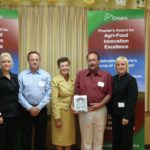 (Joan and John VanEngelen; Lambton-Kent-Middlesex MPP Marie Van Bommel; Mike and Connie VanEngelen)
(Joan and John VanEngelen; Lambton-Kent-Middlesex MPP Marie Van Bommel; Mike and Connie VanEngelen)
The VanEngelens, of Lambton County, have become partners in power. Ed, John and Mike VanEngelen installed Ontario’s first on-farm 250 KW windmill to supply power for a dairy and a hog farm. The close proximity of the farms and the strong working relationship among the three men helped move this innovation forward. The large tower and wind generator provide a highly visible example for other farm operators interested in installing an alternative energy source.
Ausable Produce Ausable Produce took an existing technology and improved upon it, to better meet the needs of the marketplace. Stan Kwarciak came up with an innovative packing option for onions. A better bag – with tighter mesh, a new fastening system – a plastic tag called “Kwik Lok”, and a more attractive label adds up to success for Kwarciak, Ausable Produce and Ontario’s consumers.The Kwik Lok tag can have traceability details printed on it relating to lot, date and producer.
Ausable Produce took an existing technology and improved upon it, to better meet the needs of the marketplace. Stan Kwarciak came up with an innovative packing option for onions. A better bag – with tighter mesh, a new fastening system – a plastic tag called “Kwik Lok”, and a more attractive label adds up to success for Kwarciak, Ausable Produce and Ontario’s consumers.The Kwik Lok tag can have traceability details printed on it relating to lot, date and producer.
Minten Farmily Farms Ltd. Three years ago, Minten Family Farms Ltd. expanded its swine operation.More livestock also means more deadstock. Frank Minten wanted an effective and environmentally sound way to handle deadstock. He found it in Manitoba – a composting system consisting of two large vessels.The innovation is in use on the Minten Farm, and was made even more efficient by obtaining provincial approval to transport the operation’s deadstock to a single location.
Three years ago, Minten Family Farms Ltd. expanded its swine operation.More livestock also means more deadstock. Frank Minten wanted an effective and environmentally sound way to handle deadstock. He found it in Manitoba – a composting system consisting of two large vessels.The innovation is in use on the Minten Farm, and was made even more efficient by obtaining provincial approval to transport the operation’s deadstock to a single location.
Munro Honey Davis and John Bryans had a “honey”of an idea when they decided to add value to their farming operation. Munro Honey was a well-established honey production facility. The Bryans wanted more.Now, they don’t just produce honey – they sell it… along with beekeeping equipment and bees, including queens, and provide pollination services. Davis and John also established a commercial meadery, which in addition to the speciality honeys, is proving to be a good draw for their new agri-tourism venture.
Davis and John Bryans had a “honey”of an idea when they decided to add value to their farming operation. Munro Honey was a well-established honey production facility. The Bryans wanted more.Now, they don’t just produce honey – they sell it… along with beekeeping equipment and bees, including queens, and provide pollination services. Davis and John also established a commercial meadery, which in addition to the speciality honeys, is proving to be a good draw for their new agri-tourism venture.

